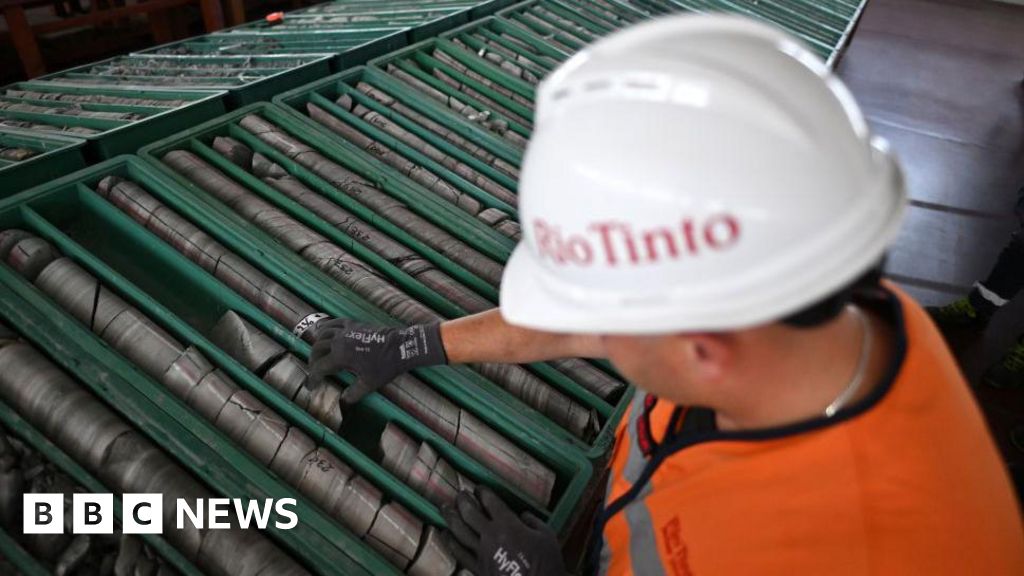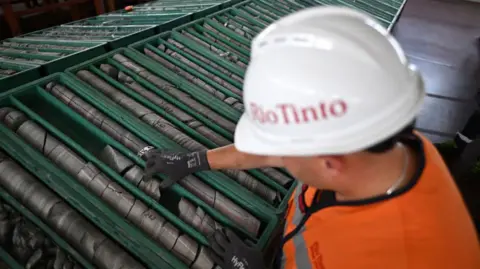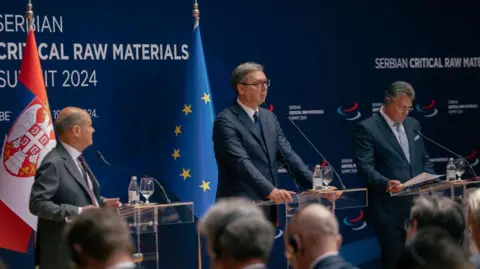EU seals ‘historic’ pact on Serbia’s lithium deposits

By Guy Delauney, BBC Balkans correspondent
 Oliver Bunic/Bloomberg
Oliver Bunic/BloombergThe EU has hailed a pact with Serbia on lithium mining as a “historic day for Serbia, as well as for Europe”, bringing to an end a race to seal the deal.
On Tuesday, Serbia restored mining giant Rio Tinto’s licence to extract the mineral in the Jadar Valley in the west of the country.
By Thursday evening, Germany’s Chancellor Olaf Scholz was in Belgrade and championing a deal he said would help to defend Europe’s economic security.
Mr Scholz was keen to ensure his country’s auto industry was at the front of the queue for supplies.
Carmakers will need ever more lithium for batteries, as the transition to zero-emission vehicles accelerates – and Rio Tinto’s Jadar project could provide as much as nine-tenths of Europe’s current lithium needs.
The European Commission’s vice-president, Maros Sefcovic, was also in Belgrade on Friday, for a meeting billed as a “critical raw materials summit”.
He was joined by what he called the “crème de la crème” of European companies with a strong interest in a new source of lithium.
They included Mercedes-Benz and Stellantis, who between them account for almost a quarter of all car sales in Europe.
 Vladimir Zivojinovic / AFP
Vladimir Zivojinovic / AFPRepresentatives of lithium battery-makers also looked on as Serbia and the EU signed an agreement to establish a “strategic partnership on sustainable raw materials, battery production chains and electric vehicles”.
While Mr Sefcovic described it a historic day, Olaf Scholz celebrated securing access to the continent’s largest-known reserves of lithium – which should reduce reliance on supplies from China.
“This decision takes courage, but it was made at the right moment,” he said, adding that the move would ensure Europe remains “sovereign in a changing world” and “is not dependent on others”.
This was praise for Serbia’s leadership, who scrapped a ban on lithium mining after a court ruling last week declared it to be unconstitutional. The government imposed the moratorium in 2022, after extensive protests across the country.
It was not just environmentalists who took part in the demonstrations. Many of those who blocked roads and bridges were new to protesting. All of them were alarmed that a foreign company had gained mining rights through a process they felt had not been transparent.
And they were concerned about the potential impact on important sources of food and water in the Jadar Valley.
Those concerns have not gone away, despite the assurances of Serbia’s president, Aleksandar Vucic.
“We will never hide anything from our people at any stage of the opening of the mine, at any part of the procedure,” he said at the signing ceremony.
“As president, I will personally fight for the environment and for the lives of our citizens in Jadar, so that their water and air are clean”.
Mr Vucic was also keen to play up the potential economic gains. He insisted that Jadar’s lithium would stay in the country.
Maros Sefcovic said that would mean Serbia would become the first European country with “the whole value chain from lithium down to the electric vehicles built here in Serbia”.
Opposition parties remain unconvinced by the president’s environmental guarantees. They never believed the lithium mine had been scrapped for good. Now they’re demanding transparency over the revived Rio Tinto project.
“There is a complete lack of trust in the government when they say it will be in the interest of citizens,” says the co-leader of the Green-Left Movement, Biljana Djordjevic.
“We fear that Serbia will be sacrificed to provide lithium for electric vehicles that pretty much nobody in Serbia can afford.”
It means that despite the celebrations in Brussels, Berlin and Belgrade, the protests against lithium mining in rural Serbia are likely to return in earnest.
Related
A New Book Argues That What Happens in Europe Doesn’t…
Remaking the World: European Distinctiveness and the Transformation of Politics, Culture, and the Economy by Jerrold Seigel “No issue in world
Poland plans military training for every adult male amid growing…
Poland’s prime minister, Donald Tusk, has said his government is working on a plan to prepare large-scale military training for every adult male in response t
2025 European Athletics Indoor Championships: Ditaji Kambundji secures women’s 60m…
Switzerland’s Ditaji Kambundji walked away from the 2025 European Athletics Indoor Championships in Apeldoorn on 7 March with much more than her first Europea
Takeaways from the EU’s landmark security summit after Trump said…
BRUSSELS (AP) — European Union leaders are trumpeting their endorsement of a plan to free up hundreds of billions of









